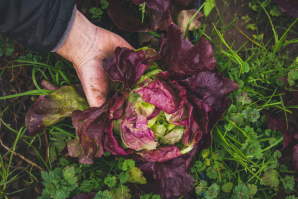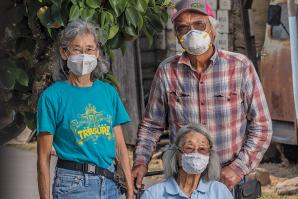It’s nearing 9 a.m. on a Friday in late June in the heart of the Sacramento Delta as Charles Van Riper drives down River Road in his white Chevy Silverado. It’s already hot, and the Central Valley is bracing for another long heatwave when temperatures are expected to climb to well over 100 degrees.
“This kind of heat is new,” Van Riper says. “We’re learning how to manage it.”
A standard FFA competition jacket hangs at the Yolo County Fair
on Aug. 15. (Photo by Helen Harlan)

“If you don’t make weight, you don’t sell,” Van Riper says. “It’s a very competitive world now.”
Van Riper, 55, has taught “ag” at Delta High since 2000, where over 86 percent of students participate in an ag activity which include viticulture, floriculture and, in today’s case, livestock. No one calls him “Mr. Van Riper.” Everyone just calls him “Van” or “Van Riper.”
FFA, known to many under its old name, “Future Farmers of America,” is a national youth organization run by the Department of Education. California FFA Association currently lists 95,000 individual members in 338 schools. According to its website, FFA is “dedicated to making a positive difference in the lives of students by developing their potential for premier leadership, personal growth and career success through Agricultural Education.” Celebrity FFA alumni include President Jimmy Carter, country music legend Johnny Cash and uber-icon Taylor Swift.
FFA chapters like Delta’s are part of Career Technical Education Pathways, often just called CTE, which aim to teach kids hands-on job skills. There are 16 “Career Clusters” representing 79 “Career Pathways” within CTE. FFA is a part of the “Agriculture Education Cluster.” It is also a CTSO, a Career Technical Student Organization, which, simply put, means that the kids are in charge.
“The students are running the program. We are just here as advisors. The kids are the ones who do it,” says Holly Chesnut. Chesnut is the Agriculture Academy Instructor of Animal and Agriscience at Cordova High School in Rancho Cordova — she’s Cordova High’s Van Riper. She’s also a Delta High grad, Class of 2010, and Van Riper was her ag teacher back when she was a Saint.
“Van Riper is the kind of teacher you never forget because everything he does, he does for the kids,” Chesnut says.
On his third morning stop, Van Riper lands at the Gonzalez ranch in Isleton. He’s here to check in on Brianna Gonzalez, 19, and her three sheep, Maggie, Dixie and Barbara. Brianna’s sisters Valentina, 9, and Angela, 16, help manage the ewes.
Brianna Gonzalez works with Delta High School FFA Advisor Charles
Van Riper to weigh her ewes with the help of sisters Valentina
Gonzalez, left, and Angela Gonzalez, right, at the family ranch
in Isleton in late June. (Photo by Helen Harlan)

“No one is nice,” Valentina Gonzalez says of the sheep trio as she holds the scale controls and helps weigh the animals.
In August, Brianna Gonzalez will show Maggie at the Yolo County Fair. It will be her last event with FFA at Delta High as, per the FFA rules, she’s aged out to make room for new members. She’s been active in FFA since middle school and is in her second year at Modesto Junior College, majoring in animal science. She wants to transfer to UC Davis to complete her undergrad and then move on to their veterinary school.
“My career goal is to be a large animal vet and beef specialist. I want to be a mobile vet. I want to go ranch to ranch working cattle all day, every day,” Brianna says. “Growing up, I knew I wanted to be a vet, but I didn’t know what kind. Being in FFA pushed me into the livestock industry. I’ve made a huge amount of connections.”
Brianna’s father is a ranch hand, and her mother is a housekeeper. She is the first in her family to go to college, and she is doing so with scholarships. She has spent much of this summer going back and forth between Isleton and Cal Poly San Luis Obispo, where she’s been on a paid internship running USDA food trials on dry carrot pumice for chickens. Professor Timothy Truax, her sheep professor at MJC, recommended her for the internship.
“My suitcase has been out all summer. I haven’t put it away,” Brianna says.
Learning life skills
Payton Dean, 16, is one of five siblings who have all participated in FFA. Her father, Scott, is a long-haul truck driver, and her mother, Lisa, works for the state. They live on 3 acres in Galt with four dogs, four goats, one cat and a brood of chickens.
Payton Dean and Chester wait in the staging pen for FFA
Showmanship at the Sacramento County Fair in June. (Photo by Lisa
Dean)

“If I lose, I know what I need to work on,” Dean says. “Rejection gets easier. Saying goodbye doesn’t.”
Payton sold Chester, her purebred Hampshire pig, in June at the Sacramento County Fair.
“Saying goodbye to Chester was the hardest thing. I spent every single day with him,” she says. “You build that connection, and then you have to say goodbye. That’s the worst part.”
Lisa Dean says that putting all five of her kids through FFA has been a lot of work, but has also brought joy.
“These kids are walking out into the real world with some good experience,” Lisa Dean says.
One of those experiences can be financial literacy or at least exposure to it.
Caden Schoenthal, 19, has taken FFA financial literacy to the next level. Schoenthal is a second-year agriculture business major at Chico State, where he’s on a scholarship through the Sacramento County Farm Bureau. He participated in FFA at Elk Grove High School with advisor Mike Albiani, started by showing pigs and then moved into steers. During his FFA adventures, Schoenthal caught the eye of Aaron Kurlee of Kurlee Cattle Company in Denair and spent last summer working full-time for the Kurlee family.
Caden Schoenthal grooms a steer for Kurlee’s Cattle Company at
The Great Western Jackpot Show in Tulare in February. (Photo
courtesy of Caden Schoenthal)

“We had about 50 head of calves there and did regular maintenance work around the property, like irrigating fields, putting up fences and cleaning water troughs,” Schoenthal says. “All the basic stuff that goes into life on the ranch.” He also participated in breeding techniques, like embryo transfers.
“It’s become my life now, doing cattle stuff after FFA because of Mr. Albiani. He kind of pushed me and made me work harder. FFA made me find passion in livestock,” Schoenthal says.
Schoenthal’s experience has resulted in a sort of financial responsibility rare to most 19-year-olds.
“All these animals I bought with my own money — they came out my own savings account. After I sold them, I put all that back in my savings, and then all I’m making from work is also coming into my savings,” he says. “I pay for all my own schooling. I pay for all my own housing. I pay for my own food.”
Not just farmers
Jake Feldheim, 19, is a second-year fire science major at Chico State and wants to be a city firefighter and EMT. Feldheim did wood and metal shop with Van Riper at Delta High. He also excelled at leadership, the competitive public-speaking aspect of FFA. He did it all while participating in basketball and baseball and serving as his football team captain.
Jake Feldheim, center, flanked by Delta High School FFA Advisor
Charles Van Riper (right) and Jake’s grandfather (left) in the
FFA woodshop at Delta High, Spring 2023. (Photo courtesy of Jake
Feldheim)

“Being FFA, you’re taught to be loud and taught to take control and learn to read the room; that helped me a lot on the (football) field,” Feldheim says. “Firefighting is very similar to football. It’s a team activity. You need all hands on deck. From FFA to football and firefighting, it’s all going to be a straight line.”
Cordova High’s FFA chapter is in its 11th year. Its forestry program students, like James Abdulla, appear to be thriving in it.
“Usually I just say, we go in the woods and look at trees,” Abdulla, 16, says when asked what it means to do forestry. “We measure them — look at their age, height, wood species, tools — all kinds of different things that you’d need to be an actual forester.”
Through forestry, Abdulla and his peers have traveled all over the state to compete in CDE (Career Development Events) — which Holly Chesnut calls “contests.” They’ve been to Shasta, Eureka and Sierra Cascades, just to name a few.
Cordova High School FFA Advisor Holly Chesnut stands with her
forestry students at the base of the famed Chandelier Tree in
Leggett in March. (Photo courtesy of Holly Chesnut)

Chesnut’s classroom, Room 203 on the upper level of the H-Wing, is covered in FFA accolades and photos. A portion of the FFA motto hangs on the wall: “Learning to do, Doing to Learn.”
One of the strongest things FFA teachers and students appear to be Doing with a capital “D” is creating a community that benefits the mental health of all involved.
“It’s a little stressful, but I want to do good. I’m doing it with good people,” Abdulla says. “I don’t do much at home. I play video games. Going outside and doing stuff with FFA is one of my favorite things to do.”
When asked, “Was there ever a time you wanted to quit FFA and walk away from ag?” None of the students interviewed for this story, current or former, said yes.
“You have a support system. You have positive pressure to drive you to succeed. It doesn’t have to be this overwhelming feeling that you have to fail,” Britnee Cote says.
Cote calls herself the “enthusiastic new ag teacher” at Cordova High, and she specializes in floriculture — known to us laypeople as growing flowers. Cote and Chesnut credit each other for much of the success of their FFA program, which they call a family.
“As a teacher our whole job is to pour out of our cup into the kids’. It’s real easy to run out, and then you have nothing to give to anyone,” Chesnut says. “Having a teaching partner to recharge you is huge.”
Alexis Sharratt, 19, is a Cordova High FFA and forestry alum. She is currently a second-year ag major at Cosumnes River College. If you include one year of pandemic home-schooling, Cordova High was the third high school Sharrat attended in four years. She says that FFA helped her manage her anxiety which she’s struggled with in the past.
“FFA pushes you out of your comfort zone. But you’re surrounded by people who support you. It’s really nice to get outside,” Sharratt says. “It’s something to look forward to.”
–
Subscribe to the Comstock’s newsletter today.
Recommended For You

From Farm to Glass
They’re just miles apart, but Capital Region wine regions are distinctively different based on their climate, terrain and soil
Each of our four wine regions has its own unique terroir, a French term describing the soil, climate and sunshine that give wines their distinct character. These winemakers want consumers to consider their wines farm-to-fork — that is, farm-to-glass.

Recruiting California’s Next Generation of Farmers
Organizations in the Capital Region provide aspiring farmers with the business tools they need to succeed
Local food may be the future, but many Northern
California farmers are struggling
or retiring. To brighten the future of farming,
nonprofits are cultivating a new crop of agrarian
dreamers with comprehensive farming programs.

Family Farmers
Family business close-up: Otow Orchard extends its family farm in Granite Bay to the community
The Granite Bay farm was established in 1911 by a Japanese
immigrant and is still run by his descendants, including his
104-year-old daughter.

Women in Leadership: Mary Paasch
Our annual salute to extraordinary women who are shaping our future
The Capital Region depends on water resources engineers like Mary Paasch, principal engineer and vice president of Stantec.



